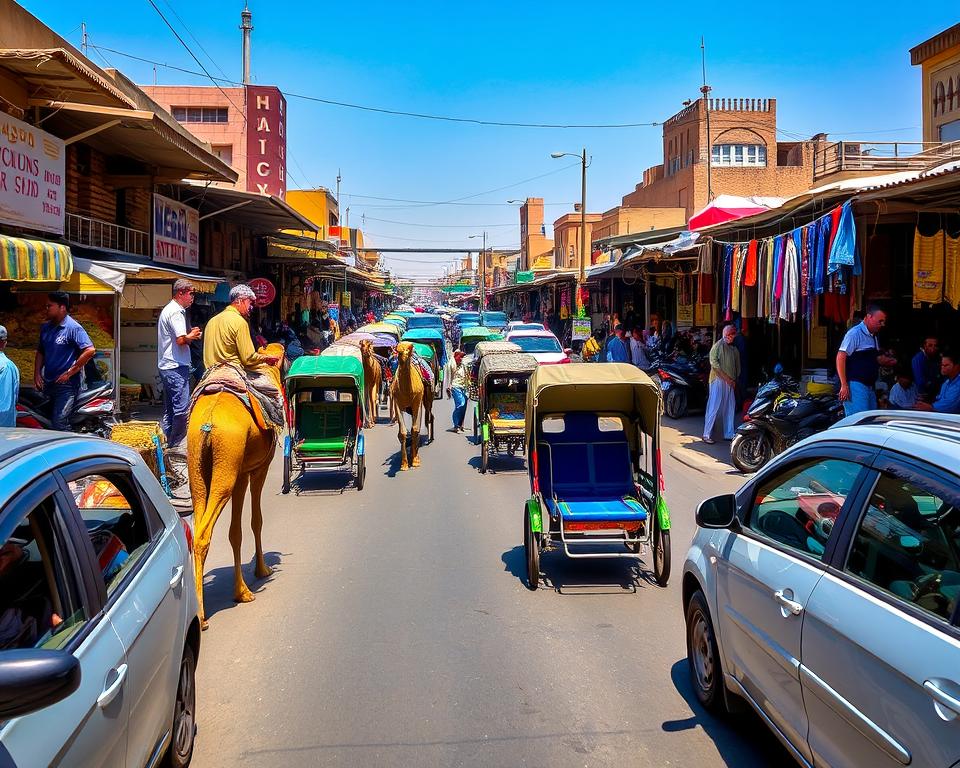Thinking about moving to the United Arab Emirates? It’s key to know about daily life in the Middle East. The area’s culture and lifestyle are both interesting and a bit scary. Braco Group, a hospitality recruitment agency, is here to help. They offer great resources on bracogroup.com and via email to make your move easier.
Getting used to local customs is crucial for a smooth start. Daily life in the Middle East is rich with cultural practices. Knowing these will help you fit into your new life here. The region mixes old traditions with modern comforts in a unique way.
Introduction to the Region
Starting this new chapter, it’s important to know the cultural details of the Middle East. By diving into these cultural practices and lifestyle, you’ll find it easier to succeed in your new home.
Key Takeaways
- Understanding daily life in the Middle East is vital for a successful transition
- Cultural practices and lifestyle in the Middle East are unique and fascinating
- Braco Group offers valuable resources for navigating the Middle Eastern job market
- Adapting to local customs and traditions is essential for a smooth transition
- Daily life in the Middle East is characterized by a blend of traditional and modern practices
- Embracing local cultural practices will help you thrive in your new environment
Understanding the Rhythm of Daily Life in the Middle East
Exploring the Middle East’s vibrant streets means learning about its daily life. From the morning call to prayer to Dubai’s busy streets, knowing local customs is key. It helps you fit in and enjoy this unique region.
Prayer times deeply influence daily routines here. Many places close for these moments, allowing people to pray. It’s a chance to rest and refresh before the day goes on.
Morning Routines and Prayer Times
Morning in the Middle East starts with the call to prayer and a mosque visit. This peaceful beginning leads to a day filled with work, socializing, and culture exploration. As you settle in, you’ll see how daily routines and customs shape your life.
Business Hours and Daily Schedules
Business hours in the Middle East differ, but most offices open from Saturday to Thursday. Fridays are for rest. Knowing these schedules helps plan your day, whether for work or exploring. Embracing local habits makes life in the Middle East easier and more fun.
| Day | Business Hours |
|---|---|
| Saturday | 8:00 AM – 5:00 PM |
| Sunday | 8:00 AM – 5:00 PM |
| Monday | 8:00 AM – 5:00 PM |
| Tuesday | 8:00 AM – 5:00 PM |
| Wednesday | 8:00 AM – 5:00 PM |
| Thursday | 8:00 AM – 5:00 PM |
| Friday | Closed |
Essential Cultural Practices to Know
Exploring Middle Eastern society means learning about its cultural practices. Traditions in the Middle East are deeply rooted in history and religion. They shape daily life, from social interactions to business dealings. Embracing these cultural practices helps you build strong relationships with locals and avoid unintentional offense.
Respecting elders, showing hospitality, and being modest are key societal norms. When meeting older individuals, use titles like “sheikh” or “hajj” to show respect. Hospitality is also crucial, with guests often receiving lavish meals and gifts. Knowing these traditions in the Middle East helps you navigate social situations with confidence and sensitivity.
Here are some essential cultural practices to keep in mind:
- Respect for elders and tradition
- Hospitality and generosity towards guests
- Modesty and humility in social interactions
- Avoiding public displays of affection
- Removing shoes before entering a mosque or home
By embracing these societal norms and traditions in the Middle East, you can build bridges with the local community. This creates a more positive and enriching experience for yourself. Understanding and respecting cultural practices is crucial for successful integration and a deeper appreciation of the region’s rich heritage.
| Cultural Practice | Description |
|---|---|
| Respect for Elders | Showing deference and respect to older individuals |
| Hospitality | Treating guests with generosity and kindness |
| Modesty | Dressing and behaving modestly in public |
Navigating Professional Life in Middle Eastern Cities
Adapting to the Middle East lifestyle means learning daily routines and customs. These customs shape your work life. Knowing them helps you fit in better at work.
Business etiquette is key in the workplace. In the UAE, greet with a handshake or a kiss, depending on who you are. Building relationships through small talk is also important.
Business Etiquette
Being on time for meetings is crucial. Dressing modestly shows respect for the culture. These habits help you make strong connections at work.
Workplace Communication
Good communication is essential. Be polite and avoid aggressive language. Building trust with colleagues makes your job easier.
Professional Dress Codes
Dress codes are important in Middle Eastern cities. Wear modest clothes to show respect. This helps you connect well with others at work.
| Country | Business Etiquette | Workplace Communication | Professional Dress Codes |
|---|---|---|---|
| United Arab Emirates | Punctuality, respect for hierarchy | Polite, courteous language | Modest, conservative attire |
| Saudi Arabia | Respect for tradition, customs | Formal, respectful communication | Conservative, modest clothing |
Social Customs and Relationship Building
Exploring the lifestyle in the Middle East means learning about local habits and societal norms. These are key to forming strong bonds with locals. Showing hospitality and respect is vital, as it lays the groundwork for both personal and professional ties.
In the Middle East, trust, loyalty, and respect are at the heart of relationships. Knowing the societal norms helps you build these connections. For example, using formal titles and last names shows respect, especially to elders or those in authority.
Some important social customs in the Middle East include:
- Respect for elders and tradition
- Importance of hospitality and generosity
- Value placed on loyalty and trust
By adopting these local habits and societal norms, you can create deeper, more meaningful connections. This will enhance your lifestyle in the Middle East.
| Custom | Description |
|---|---|
| Hospitality | Generous reception and treatment of guests |
| Respect for elders | Showing deference to older individuals and tradition |
| Loyalty and trust | Valuing long-term relationships and mutual trust |
Food Culture and Dining Etiquette
Exploring the Middle East means diving into its food culture. Meal times and traditions differ, but some customs stay the same. For example, the Arabic coffee ceremony is key in social events, showing the area’s warm welcome.
In the United Arab Emirates, you’ll see both old and new dining styles. From street food to fancy restaurants, there’s a lot to try. It’s important to follow local rules, like taking off your shoes in traditional places or using your right hand when eating.
- Respecting Ramadan traditions, such as not eating in public during daylight hours
- Understanding restaurant protocols, like not leaving the table until everyone has finished eating
- Appreciating the significance of meal times, like the importance of Friday brunch in many Middle Eastern countries
By learning these customs, you can connect better with locals. You’ll feel more at ease in Middle Eastern society.
| Traditional Middle Eastern Dishes | Description |
|---|---|
| Shawarma | A popular street food made from grilled meat, served in a pita bread with vegetables and tahini sauce |
| Machboos | A rice dish flavored with spices, meat or fish, and vegetables |
| Luqaimat | Sweet dumplings filled with dates, nuts, and spices, typically served during Ramadan |
Transportation and Getting Around
Understanding the local transportation systems is key when you move to the Middle East. You’ll likely use taxis, public transport, and maybe drive. Taxi services and ride-hailing apps are common in most cities.
Knowing the local habits, like peak hours and traffic, helps plan your commute. In Dubai, the metro is great for avoiding traffic. You can also use public buses or water taxis based on your preference.

- Learn about different taxis and their costs
- Download ride-hailing and public transport maps
- Plan your route to avoid traffic
By getting used to local transport, you can move around easily and enjoy your new life in the Middle East.
Shopping and Consumer Behavior
Exploring the markets and malls of the Middle East is a unique adventure. You’ll find a mix of old and new shopping experiences. Traditional souks let you dive into local culture and learn to bargain.
Modern malls, on the other hand, offer a wide range of international brands. They cater to the diverse tastes of the region’s people. Here, you’ll see that cultural values like hospitality and respect for tradition are still important.
Traditional Souks
Traditional souks are a key part of Middle Eastern culture. These lively markets sell everything from spices to jewelry. Walking through, you’ll experience the local culture, learn to bargain, and see how locals live.
Modern Malls
Modern malls offer a different shopping vibe. They are clean, air-conditioned, and well-organized. You’ll find international brands and a variety of dining and entertainment options.
Understanding local customs and daily routines makes your mall visit better. It helps you enjoy the shopping experience more.
Family Life and Social Structure
Starting a new life in the Middle East means learning about local habits and societal norms. Family values and tradition are at the heart of life here. Family life is very important, and social structures often revolve around the family.
Hospitality is a big part of social life. You’ll be welcomed warmly and should show respect and gratitude in return. Building strong relationships with locals depends on these values.
Some key aspects of family life and social structure in the Middle East include:
- Respect for elders and tradition
- Importance of family gatherings and social events
- Role of hospitality in building relationships
By embracing these local habits and societal norms, you can build a strong foundation for your new life in the Middle East. Understanding and respecting the lifestyle here is key to a successful and fulfilling experience.
Weather Patterns and Seasonal Activities
As you start your new life in the Middle East, it’s key to know the weather and activities by season. The hot summers and mild winters will shape your daily life. For example, in summer, you might adjust your schedule to stay cool. In winter, you can enjoy desert safaris or visit traditional souks.
Winter is a great time to dive into the Middle East’s lively social scene. You can go to cultural events, festivals, and concerts. These are big parts of life here. Here are some tips to help you enjoy:
- Stay hydrated and wear light clothes in summer
- Try outdoor fun like hiking or camping in winter
- Respect local customs, especially during Ramadan
By getting into the local weather and activities, you’ll improve your daily life. You’ll get to know the Middle Eastern customs and lifestyle better. Stay open to the seasons, and your new life will be full of fun and chances.

| Season | Weather Patterns | Seasonal Activities |
|---|---|---|
| Summer | Hot and humid | Indoor activities, water sports |
| Winter | Mild and pleasant | Outdoor activities, cultural events |
Conclusion: Embracing Your New Life in the Middle East
Starting your journey to the Middle East is exciting. It’s a chance to dive into a vibrant culture and rich traditions. By learning about daily life and cultural practices, you can make strong connections and succeed in your new home.
Adapting to the Middle Eastern lifestyle takes time. Be patient with yourself. Try to meet locals through events, festivals, or simple chats with neighbors. This way, you’ll grow to love the culture and make your stay rewarding.
If you’re looking to advance your career, check out the job scene in the Middle East. Visit Braco Group or email contact@bracogroup.com. To apply, sign up on Braco Group’s job platform. With an open mind and a desire to learn, you can find great opportunities. Enjoy the daily life in the Middle East, its cultural practices, and lifestyle, which are truly special.
FAQ
What are the typical morning routines and prayer times in the Middle East?
In the Middle East, many daily routines start with prayer. The Fajr prayer happens just before sunrise. Then, there’s the Dhuhr prayer in the early afternoon, the Asr prayer in the late afternoon, the Maghrib prayer at sunset, and the Isha prayer in the evening.
How do business hours and daily schedules differ in the Middle East compared to other parts of the world?
The Middle East works from Sunday to Thursday. Friday and Saturday are the weekend. Business hours are early, with a long lunch break in the middle of the day. Knowing this helps when planning meetings or appointments.
What are some of the essential cultural practices and societal norms in the Middle East?
Hospitality, respect for elders, and modest dress are key in the Middle East. It’s customary to remove shoes at home and greet with a handshake. Understanding these norms helps you connect with locals and navigate daily life.
What business etiquette and workplace communication styles are important to know in the Middle East?
Business etiquette in the Middle East is different from Western norms. It’s important to maintain eye contact, use formal titles, and avoid sensitive topics. Decisions are often made collectively, not by one person.
How do social customs and relationship building differ in the Middle East?
Building personal relationships is highly valued in the Middle East. Socializing and hospitality are key. Respect for elders and hierarchy are also important.
What are the key aspects of food culture and dining etiquette in the Middle East?
Meals are central to Middle Eastern culture. It’s customary to eat with the right hand and share food. Understanding meal times, restaurant etiquette, and dietary restrictions is important.
How do transportation and getting around work in the Middle East?
Transportation varies by location in the Middle East. Some cities have good public transit, while others rely on private vehicles and taxis. Knowing local traffic patterns and parking rules is crucial.
What are the unique aspects of shopping and consumer behavior in the Middle East?
Shopping in the Middle East combines traditional souks and modern malls. Haggling and bargaining are common. It’s important to know local customs and consumer trends.
How do family life and social structure differ in the Middle East?
Family and social relationships are very important in the Middle East. Respect for elders, hospitality, and community are key. Understanding these values helps you connect and navigate daily life.
How do weather patterns and seasonal activities shape daily life in the Middle East?
The Middle East has hot, dry summers and mild winters. People adjust their routines and activities to the weather. Summer is for indoor activities, while winter is for outdoor events.



